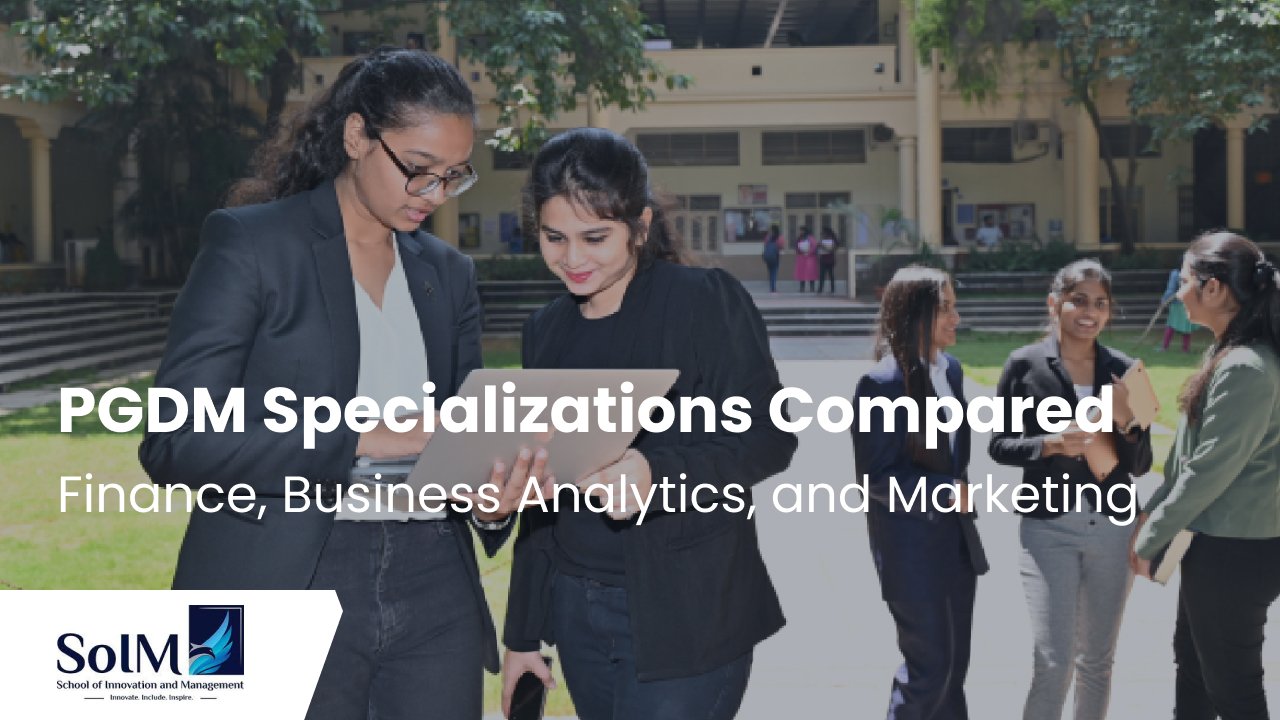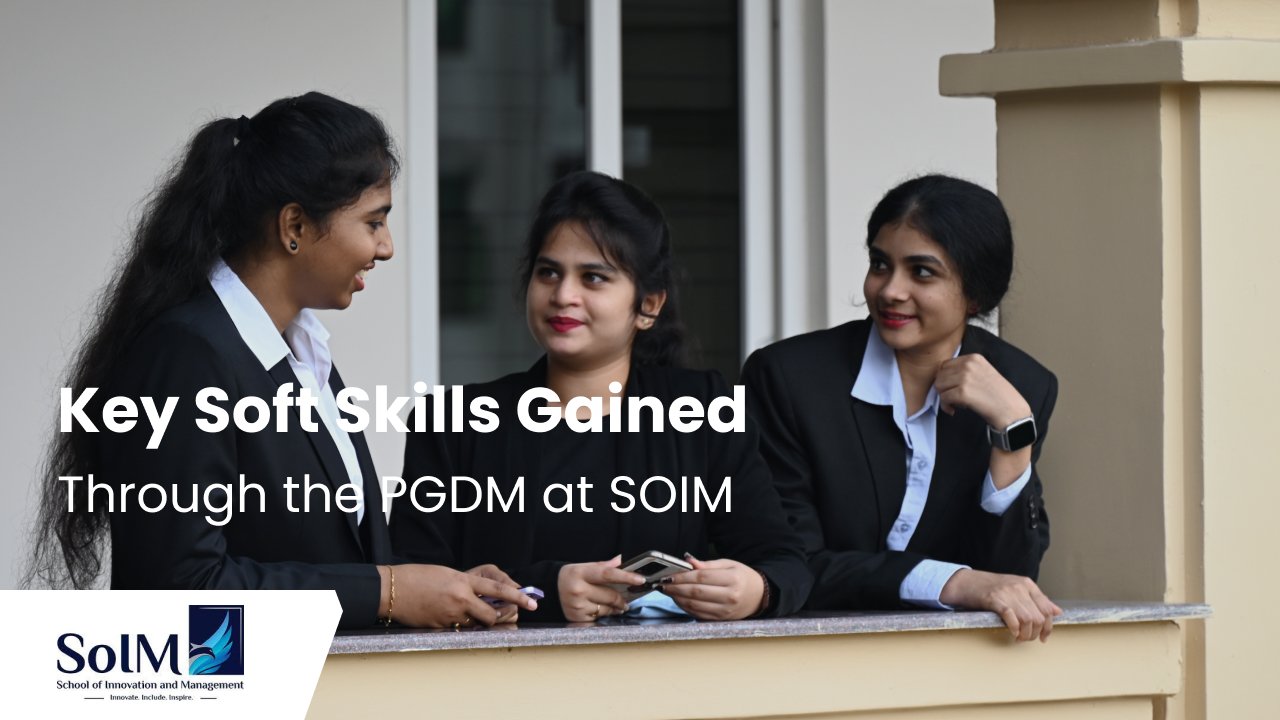Empowering Your Journey: Unlocking Doors to PGDM Admission Process
PGDM (Post Graduate Diploma in Management) admission at SoIM Education refers to the process by which candidates are selected and granted admission to PGDM programs offered by various business schools and institutes. It involves fulfilling the eligibility criteria, appearing for the entrance exam, and going through the subsequent selection process.
PGDM Admissions 2024 Calendar
| Exam | Registration Date | Exam Date |
| CAT | To be Announced | 26-Nov-2023 |
| XAT | To be Announced | To be Announced |
| SNAP | To be Announced | To be Announced |
| IIFT | To be Announced | To be Announced |
| CMAT | 13-Mar-2023 | 04-May-2023 |
| NMAT | To be Announced | To be Announced |
| MAT | 16-May-2023 (PBT) 09-May-2023 (CBT 1) 30-May-2023 (CBT 2) 04-May-2023 (IBT) 10-May-2023 (IBT) 17-May-2023 (IBT) |
21-May-2023 (PBT) 14-May-2023 (CBT 1) |
Eligibility Criteria – Admissions PGDM 2023
The eligibility criteria for admissions to a Post Graduate Diploma in Management (PGDM) program can vary depending on the specific institution or business school offering the program.
However, here are some general eligibility criteria that are commonly observed:
Educational Qualifications: Candidates should have a Bachelor’s degree or an equivalent qualification from a recognized university or institution. The discipline of the Bachelor’s degree may vary depending on the program, but it is typically required to be in any field of study.
Minimum Percentage/CGPA: Many institutions have a minimum percentage or Cumulative Grade Point Average (CGPA) requirement for eligibility. This minimum requirement can vary, but it is generally in the range of 50% to 60% or a CGPA of 5.0 to 6.0 on a scale of 10. Some institutions may also consider the performance in specific subjects or the final year of the Bachelor’s degree.
Work Experience (if applicable): Some PGDM programs may require candidates to have prior work experience. The duration of work experience required can vary, but it is typically in the range of 0 to 2 years. Work experience can add value to the application and is often preferred for executive or specialized PGDM programs.
Entrance Examinations: Many institutions require candidates to appear for specific entrance examinations to assess their aptitude and knowledge. Common entrance exams for PGDM programs in India include CAT (Common Admission Test), XAT (Xavier Aptitude Test), GMAT (Graduate Management Admission Test), CMAT (Common Management Admission Test), and MAT (Management Aptitude Test).
Selection Process: Apart from academic qualifications and entrance exam scores, the selection process for PGDM programs often includes other components such as group discussions, personal interviews, written tests, and/or case studies. These components aim to evaluate a candidate’s communication skills, analytical thinking, problem-solving abilities, and suitability for the program.
Entrance Exam Scores: In addition to meeting the eligibility criteria, institutions often consider the scores obtained in the designated entrance exams. The scores play a crucial role in the selection process and may carry a significant weightage in determining the candidate’s eligibility for admission. It is important to achieve a competitive score to increase the chances of securing a seat in the program.
Statement of Purpose (SOP): Many institutions require candidates to submit a Statement of Purpose or a Personal Statement as part of the application process. This document allows candidates to express their motivation, career goals, and reasons for pursuing a PGDM program. The SOP helps institutions assess the candidate’s clarity of purpose, communication skills, and alignment with the program’s objectives.
Letters of Recommendation (LORs): Some institutions may request letters of recommendation from individuals who can provide insights into the candidate’s academic performance, work experience, or personal qualities. These letters are typically written by professors, supervisors, or professionals who can attest to the candidate’s capabilities and suitability for the PGDM program.
Academic Performance: While meeting the minimum educational qualifications, institutions may also consider the candidate’s academic performance throughout their undergraduate studies. This includes reviewing the candidate’s transcripts, grade point average, and any honors or awards received. Strong academic performance can enhance the candidate’s chances of securing admission to a competitive PGDM program.
Admission and Evaluation Process
The admission and evaluation process of a Post Graduate Diploma in Management (PGDM) program typically involves multiple stages. While the specific process can vary among institutions, here is a general overview of the typical steps involved:
Application: Candidates interested in pursuing a PGDM program need to submit an application form to the respective institution or business school. The application form may be available online or in a physical format. Candidates are required to provide their personal details, educational background, work experience (if applicable), entrance exam scores, and other relevant information as specified by the institution.
Entrance Exam: Many institutions require candidates to appear for a designated entrance exam, such as CAT (Common Admission Test), XAT (Xavier Aptitude Test), GMAT (Graduate Management Admission Test), CMAT (Common Management Admission Test), or MAT (Management Aptitude Test). The entrance exam scores play a significant role in the evaluation process and are used to shortlist candidates for further stages.
Shortlisting: Based on the applications received and entrance exam scores, institutions shortlist candidates for the next stage of the evaluation process. Shortlisting criteria may include a minimum score or percentile in the entrance exam, academic performance, and other factors such as work experience or diversity considerations.
Written Test/Group Discussion (GD): Shortlisted candidates are often required to participate in a written test or a group discussion. The written test may assess a candidate’s writing skills, analytical thinking, or subject knowledge. The group discussion aims to evaluate a candidate’s communication skills, ability to work in a team, and their understanding of various topics or issues.
Personal Interview (PI): Candidates who perform well in the written test or group discussion are typically invited for a personal interview. The personal interview is conducted by a panel of faculty members or industry experts and focuses on assessing the candidate’s aptitude, domain knowledge, problem-solving abilities, communication skills, and overall suitability for the program. The panel may ask questions related to the candidate’s educational background, work experience, career goals, or current affairs.
Final Selection: After the completion of the written test, group discussion, and personal interview, the institution prepares the final merit list based on the candidate’s performance in each stage of the evaluation process. The final selection is typically determined by a combination of factors, including entrance exam scores, performance in the written test, group discussion, and personal interview, academic records, work experience, diversity considerations, and other criteria specified by the institution.
Offer of Admission: Candidates who are selected for admission to the PGDM program are offered an admission letter or offer of admission by the institution. The offer letter includes details regarding the program, fee structure, deadlines, and other relevant information. Candidates need to accept the offer and complete the necessary formalities to secure their admission.
Benefits of getting admission into the right PGDM College
Getting admission into the right PGDM (Post Graduate Diploma in Management) college can offer several benefits that can significantly impact your career and personal growth. Here are some key advantages:
Quality Education: Reputed PGDM colleges are known for their rigorous and updated curriculum, industry-relevant course content, and experienced faculty members. These colleges often have a strong focus on practical learning, case studies, industry interactions, and experiential projects, which provide a holistic and well-rounded education.
Industry Exposure and Networking: The right PGDM college can provide excellent industry exposure through guest lectures, workshops, seminars, internships, and placement opportunities. These interactions expose you to professionals and experts from various industries, enabling you to build a strong network and gain insights into industry trends, practices, and challenges.
Placement Opportunities: Top-rated PGDM colleges often have a robust placement cell and strong industry connections. They have a track record of placing students in reputed companies and organizations. The college’s brand reputation, alumni network, and corporate partnerships can enhance your chances of securing desirable job offers and internships.
Skill Development: PGDM programs focus on developing a range of skills required in the corporate world, such as leadership, teamwork, communication, problem-solving, critical thinking, and decision-making. The curriculum, along with various co-curricular activities and industry interactions, helps in honing these skills, making you better equipped to succeed in your professional endeavors.
Personal and Professional Growth: A good PGDM college not only imparts knowledge but also fosters personal and professional growth. It provides a conducive learning environment, encourages innovation and creativity, and instills a sense of discipline, professionalism, and ethical values. You get opportunities to participate in extracurricular activities, clubs, committees, and events, which help in overall personality development.
Alumni Network: Reputed PGDM colleges often have a strong and extensive alumni network. Being part of such a network can offer numerous benefits, including mentoring opportunities, career guidance, industry connections, job referrals, and collaboration on projects. The alumni network can serve as a valuable resource throughout your career, providing a support system and access to diverse opportunities.
Recognition and Brand Value: Admission into a renowned PGDM college adds value to your resume and enhances your credibility. Employers often give preference to candidates from reputable institutions, recognizing the quality of education and training received. The college’s brand value and reputation can open doors to better job prospects, higher salary packages, and increased career opportunities.
Conclusion
The PGDM (Post Graduate Diploma in Management) admission process is of utmost importance as it plays a crucial role in selecting candidates who possess the necessary skills, knowledge, and aptitude for pursuing a management program. The admission process at SIOM ensures that only deserving and competent individuals are admitted, thereby maintaining the quality and integrity of the program.



